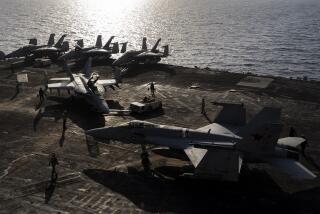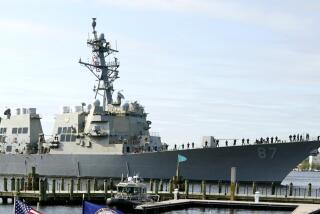Upcoming fiscal year deals tough hand to civilian ships working for military
- Share via
Sequestration may seem like a long-ago problem that hasn’t had many of the disastrous effects once feared, but for one group of people, it could really start to hurt on Oct 1. That’s when the nation’s new budget will go into effect, and unless something is changed, the program known as the Maritime Security Program, part of the Merchant Marines, is going to take a big haircut. About one-third of its 60 militarily useful commercial ships, which carry most of the nation’s military supplies to and from places such as Afghanistan, are going to lose their subsidy and be eliminated.
The impending deadline comes as the U.S. prepares for war in Syria, and as Hollywood releases a blockbuster about the Merchant Marines. “Captain Phillips,” a movie starring Tom Hanks and Catherine Keener, will be released in October, and tells the story of the Maersk Alabama, a U.S.-flagged ship hijacked by Somali pirates.
The Merchant Marines is a fleet of civilian-owned vessels staffed entirely by U.S. citizens, used in both peace and war -- the first-ever U.S. merchant marine ship helped capture a British vessel in 1775. In the Maritime Security Program, part of the Merchant Marines, there are currently 60 ships, which helped provide 95% of the cargo supporting the military in Afghanistan and Iraq. The government prefers to use U.S. ships with U.S. citizens for security reasons but uses private vessels to save money. Each ship receives an annual subsidy of about $3.1 million per year from the government.
But in 2012, the program had a surplus, and Congress authorized only $174 million for the program, rather than $186 million. Then, sequestration occurred, implementing cuts to the lower amount. Now, unless Congress restores the original funding, some of the ships will have to be pulled out of commission, said Don Marcus, president of the International Organization of Masters, Mates & Pilots, which represents many of the merchant marines.
“It’s just completely astounding that for the price of a couple helicopters, you can put this much of a dent in our national security,” Marcus said.
A separate proposal would also lessen the Merchant Marines’ role in providing food aid to foreign countries. Rather than shipping American-grown food to foreign countries in need of aid, it would give the countries money to grow their own food. This would also lessen the need for Merchant Marine ships, which carry much of this foreign aid.
With less funding for Merchant Marines ships, shipping companies will likely staff cargo ships with foreign seamen, who are less expensive than American seamen and who follow different standards on ships, Marcus said. This will affect employment for the 12,000 members of the Merchant Marines. Some cargo will have to be shipped by the military for security reasons, which will cost more money than the marines would have, Marcus said.
A 2006 study by the Military Sealift Commission found that if the military were to try and replace the ships tt uses from the Military Security Program with its own vessels, it would have to spend $13 billion. If the military does not have enough Merchant Marines ships to use, it will either trust its supplies to foreign seamen, outsourcing U.S. jobs, or pay for its own military to transport supplies, according to a March letter on this issue signed by “Buck” McKeon, the chair of the House Armed Services Committee.
“Without funding the MSP and ensuring the continued operation of its maritime security fleet, America would either have to place the safety of our troops and the security of our nation in the hands of foreign shipping interests or be forced to spend billions more of the taxpayer’s dollars,” the letter said.
ALSO:
Consumer confidence drops after hitting six-year high
Growth in consumer spending, personal income slows in July
National fast-food protests kick off in New York
More to Read
Inside the business of entertainment
The Wide Shot brings you news, analysis and insights on everything from streaming wars to production — and what it all means for the future.
You may occasionally receive promotional content from the Los Angeles Times.











